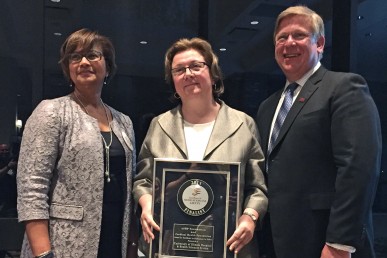Genetic test helps guide dosing of blood-thinners
A new genetic testing program at the University of Illinois Hospital & Health Sciences System for patients on blood-thinning drugs showed reduced complications and improved patient safety — with significant cost
savings — over its first 16 months in operation.

Edith Nutescu (center), associate professor of pharmacy systems, outcomes and policy, flanked by Janet Might, vice chair of the board of directors of the ASHP Foundation, and William Owad Jr., chair of the board of directors, ASHP Research and Education Foundation
UI Health’s Personalized Medicine Program, led by UIC pharmacy professor Edith Nutescu, is one of three finalists for the 2015 Award for Excellence in Medication-Use Safety announced Dec. 6 by the American Society of Health-Systems Pharmacists Foundation.
Begun in 2012, the UI Health program aims to reduce emergency visits and hospital readmissions due to the prescription medications warfarin and clopidogrel. Warfarin, the most widely used anticoagulant, is prescribed for patients at risk for blood clots. Clopidogrel is an anti-platelet agent used to prevent heart attack and stroke.
Proper dosages of warfarin and clopidogrel are difficult to determine, especially initially, due to variables that include a patient’s diet, age and other medications. Patients prescribed too high a dose are at risk of life-threatening bleeding. Too low a dose leaves them vulnerable to dangerous blood clots.
Incorporating genetic information into therapeutic decision-making should optimize medication use, Nutescu said, which would reduce the failure rate during initial stages of treatment, improve patient outcomes, and lower costs.
More than 800 patients were genotyped for warfarin and clopidogrel dosing in the initial phase of the program (a number that has since increased to more than 1,500). Hospital readmission rates due to drug-related complications within 30 days decreased by 77 percent, and within 90 days by 68 percent, Nutescu said, resulting in an estimated cost savings of $2,043 per patient — nearly $600,000 annually at UI Health.
UI Health is among the first academic medical centers to incorporate a pharmacist-led personalized medicine program as part of its standard care for patients taking potentially dangerous medications, Nutescu said. Along with pharmacists, UI Health’s personalized medicine team includes cardiologists, hematologists, molecular pathologists, information technologists and health system administrators.
Pharmacists are uniquely suited to lead interdisciplinary teams of professionals that use pharmacogenomics for precision medicine, said Jerry Bauman, dean of the UIC College of Pharmacy and interim vice president for health affairs at UI Health.
“Our pharmacogenetics service is one of the first in the nation, and the clinical outcomes we’ve had are very impressive,” Bauman said. “Simply put, this innovative service improves patient care by personalizing each patient’s drug therapy.”
